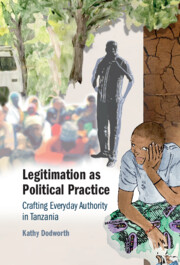Book contents
- Legitimation as Political Practice
- Legitimation as Political Practice
- Copyright page
- Dedication
- Contents
- Figures
- Tables
- Foreword
- Preface and Acknowledgements
- Abbreviations
- Introduction
- 1 Legitimacy and Legitimation
- 2 Practicing Legitimation
- 3 ‘We Go Deeper’
- 4 ‘In and Out’
- 5 ‘I Was Chosen; It’s the Work That’s Voluntary’
- 6 ‘These People, They Just Sit!’
- 7 ‘Reporting Has All Sorts of Issues!’
- Conclusion
- Appendix A: Interviews
- Glossary
- References
- Index
2 - Practicing Legitimation
The ‘How’ of Non/State Governance
Published online by Cambridge University Press: 05 May 2022
- Legitimation as Political Practice
- Legitimation as Political Practice
- Copyright page
- Dedication
- Contents
- Figures
- Tables
- Foreword
- Preface and Acknowledgements
- Abbreviations
- Introduction
- 1 Legitimacy and Legitimation
- 2 Practicing Legitimation
- 3 ‘We Go Deeper’
- 4 ‘In and Out’
- 5 ‘I Was Chosen; It’s the Work That’s Voluntary’
- 6 ‘These People, They Just Sit!’
- 7 ‘Reporting Has All Sorts of Issues!’
- Conclusion
- Appendix A: Interviews
- Glossary
- References
- Index
Summary
This chapter lays out the epistemological, methodological and ethical considerations in answering the book’s core question. Legitimation requires a considerable amount of work and indeed creativity, rendered invisible by some methodologies to date. A practice-based approach, here bolstered by the use of critical ethnography, places the agential, iterative and relational aspects of legitimation centre frame. Such an approach benefits from late modern writers in the West but also crucially insights from anti/postcolonial scholars, including on the African continent. The chapter sets out a moral concern regarding the location of the always assumed, never seen, legitimation ‘subject’, obscured by the shadow of theory-making or developmental problem-solving. It argues that interpretive praxeology speaks to both methodological and ethical concerns, aiding the move to deverticalize research. The chapter also sets out the particular value of the Tanzanian case in the wake of its rapid liberalization, both in its specificities but also its broader resonance as a microcosm of the reconstituting public, with the global inserted into the local in new and illuminating ways.
- Type
- Chapter
- Information
- Legitimation as Political PracticeCrafting Everyday Authority in Tanzania, pp. 37 - 57Publisher: Cambridge University PressPrint publication year: 2022

